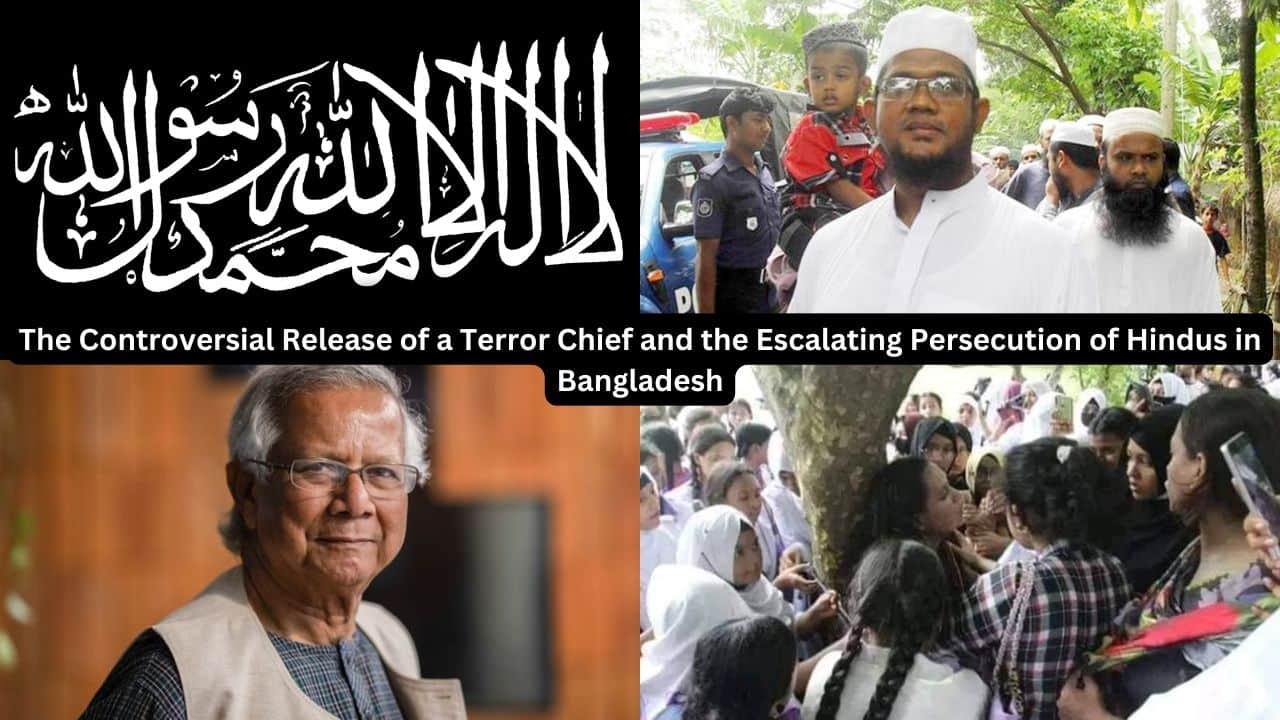The Controversial Release of a Terror Chief and the Escalating Persecution of Hindus in Bangladesh
23 Aug 2024 07:20:15

The recent moves of the government led by Muhammad Yunus are sounding many alarm bells that are resonating in Bangladesh and beyond. Mufti Jashimuddin Rahmani, leader of Al-Qaeda-inspired terror outfit Ansarullah Bangla Team (ABT), was freed from prison and has raised alarms among counter-terror officials and rights advocates.
This move, widely controversial in the backdrop of increasing persecution being perpetrated against Hindus by Bangladeshi Muslims, has reached its upper limits. Reports that are coming recently say that Hindu teachers and professors were insulted, beaten up, and forced to resign as a consequence at the hands of majority Muslim students. The incidents are in fact just the tip of the iceberg when it comes to systematic discrimination and violence against Bangladeshi Hindu minorities.
The Release of Mufti Jashimuddin Rahmani: A Dangerous Precedent
The release of Mufti Jashimuddin Rahmani from jail has sent shockwaves through counter-terrorism establishments. Rahmani, the leader of the radical group the Ansarullah Bangla Team, which is believed to be inspired by Islamist extremist outfit Al-Qaeda, has been associated with a string of violent and extremist activities in Bangladesh.

Targeting secular activists, bloggers, and other people who oppose their radical ideology have faced similar attacks by his group. Given Rahmani's sizable reputation in the terrorism world, counter-terrorism officials are alarmed over what his release represents, and they fear that it may also accelerate escalating efforts by extremists operating from within their borders.
Rahmani, who was granted bail in all the cases filed against him, walked out of the jail on August 18. This has flummoxed many given that he faced the extremely serious charge of terrorism and attempting to incite violence.
His bail has been widely viewed as a setback to the counter-terrorism endeavour in Bangladesh. Counter-terrorism officials view this as a troubling move: that it would send the wrong signal to other radicals and effectively neuter voluminous efforts across years to clamp down terrorism in their country.
Persecution of Hindus in Bangladesh: A Growing Crisis
At the same time, there has been a shameful rise in attacks on Hindus, especially educationists in Bangladesh. It has been reported that Hindu teachers and professors are being targeted one after another by Muslim students.
These educators have been targeted with verbal abuse, beaten up, and, in worse cases, driven out of the schools and colleges. Every day the pressure on Hindus to sign resignation letters is growing, with the view of terminating all 2.5 million Hindus who are working in Bangladesh as working professionals.

The reported trend is strikingly consistent with a larger plan directed against the Hindus, who have always been discriminated against and suffered violence in Bangladesh.
Targeting Hindu teachers in a systematic manner may eradicate any influence of Hindus from the educational system and fortify the radical Islamist ideology. The effects of this persecution are not limited to the ones being targeted but also have begun instilling fear and a sense of insecurity within the Hindu community at large.
The Broader Implications: Regional Stability at Risk
The steps taken by the Yunus government, such as freeing a terrorist leader and continuing to play politics with Hindy suffering in Bangladesh, have wider repercussions on regional stability. Rahmani's release can send extremist activities soaring, not just in Bangladesh but also in neighbouring nations like India. With the geographical proximity and common history, any terrorism or extremist violence in Bangladesh is also going to affect India immediately, especially bordering areas.
It will only go further to ensure that the relationship between these countries remains far from friendly, as systematically keeping Hindus down in Bangladesh is soon going to take its toll. The ongoing violence and new stories of discrimination against Hindus may increase the strain between the two nations, which can destabilise this region more widely.
International Concerns and the Role of Global Powers
Yunus's government has not escaped the attention of international forums. There are now fears that the policies of the government have come under some external influence, particularly from the USA. Going further, some critics even began to accuse Muhammad Yunus of being the CIA's puppet sent on a mission as a part of broader geopolitical strategy that was aimed at advancing U.S. interests in the region.
Though impossible to verify, these allegations do reveal the profound sense of mistrust and suspicion harboured by many Bangladeshis towards the role played by foreign powers in their nation's affairs. True or not, the perception that Muhammad Yunus is acting on behalf of the CIA's puppet government will stoke further turmoil across Bangladesh.
The Need for International Intervention and Support
With such a serious issue, it is essential that the international community come forward and help in protecting minority Hindus in Bangladesh. Not only human rights organisations, but the global powers should exert pressure on the Yunus government that it must act immediately to stop this persecution of Hindus and make sure all the citizens have a place under the sky.
Bangladesh also needs to get a stronger counter-terrorism act in place! Experience tells us that groups like the Ansarullah Bangla Team go underground and re-emerge once they are no longer being watched. The release of Rahmani underscores the need for a more assertive and unified anti-terror response from the local as well as international authorities.
Conclusion
In Bangladesh, the actions of the government led by Muhammad Yunus in recent times have created an atmosphere of fear and insecurity. With Mufti Jashimuddin Rahmani released and the growing spate of Hindu persecution, which is a deadly cocktail that people in India should worry about, if the problem is not nipped quickly on its bud, it will kill both domestic stability and regional security as well.